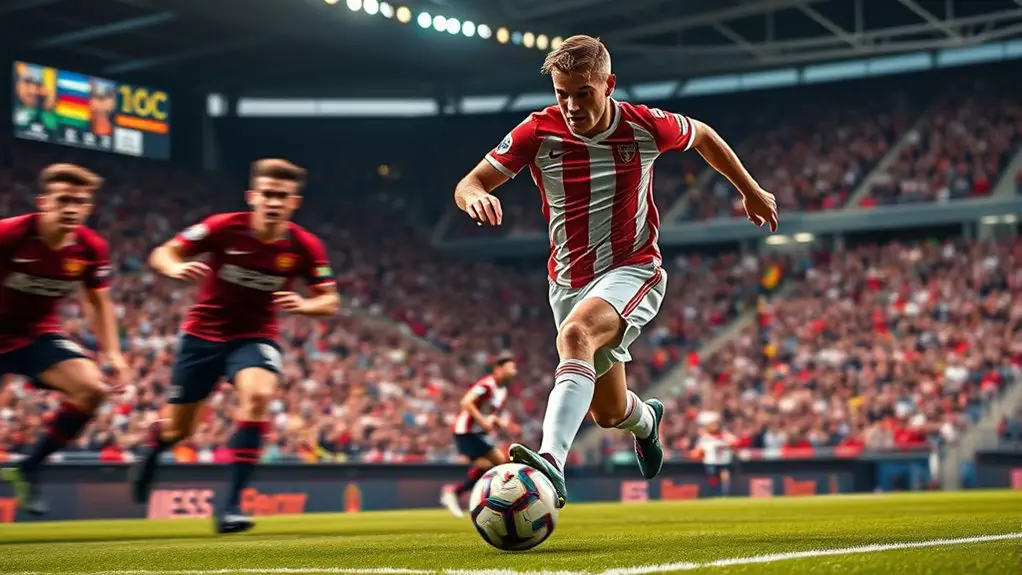In fast sports, decision-making speed is essential. It allows you to seize opportunities and outmaneuver opponents quickly. When you're faced with split-second choices, your ability to react can change the outcome of the game. Factors like mental rehearsal, physical fitness, and quick reflexes all play significant roles in enhancing your decision-making capabilities. Ultimately, mastering this skill can lead to victories on the field. Discover how various techniques can further sharpen your instincts.
The Psychology Behind Quick Decision-Making
When you're in the heat of competition, the ability to make quick decisions can mean the difference between victory and defeat. Your mind races, and every moment counts. Understanding cognitive biases can empower you to overcome mental traps that skew your judgment. These biases often cloud your thinking, leading to hesitation when you need clarity.
One way to sharpen your decision-making is through mental rehearsal. By vividly imagining various scenarios and your responses, you prepare your brain for real-time challenges. This practice builds confidence and speeds up your reactions, allowing you to break free from the paralysis of indecision. Additionally, integrating meditation practices can enhance your focus and clarity, further supporting quick decision-making under pressure.
Embrace the freedom that comes from knowing you can trust your instincts. The more you engage in these mental drills, the more instinctive your decisions become in high-pressure moments. Don't let cognitive biases hold you back; harness the power of your mind to enhance your performance.
Physical Factors Influencing Decision Speed
While mental factors play an essential role in decision-making, physical attributes also greatly influence how quickly you can react in fast-paced sports. Your reaction time is critical; it's a blend of your sensory processing speed and muscle response. High cognitive load can slow you down, making it important to train your body for peak performance. Incorporating mobility training into your routine can further enhance your physical attributes, optimizing your decision-making speed.
| Physical Factor | Description |
|---|---|
| Muscle Fiber Type | Fast-twitch fibers improve speed. |
| Flexibility | Enhanced range of motion aids agility. |
| Strength | Greater power can lead to quicker reactions. |
| Endurance | Sustained energy keeps you focused. |
| Coordination | Better control leads to faster responses. |
Impact of Decision-Making on Game Outcomes
Physical attributes, like reaction time and muscle response, set the stage for how athletes perform in fast sports. But it's your decision-making that can truly dictate game outcomes. When you're in the heat of competition, your ability to assess situations swiftly can make or break your team's success. Here's how decision-making impacts the game:
- Tactical Awareness: Recognizing opponents' positions and intentions allows you to exploit gaps in their defense.
- Game Strategy Execution: Quick decisions enable seamless execution of plays, keeping opponents guessing and off-balance.
- Momentum Shifts: A rapid response to in-game events can shift momentum, giving your team a psychological edge.
In a sport where every second counts, cultivating sharp decision-making skills can elevate your game, granting you the freedom to play with confidence and creativity. After all, it's not just about speed; it's about smart speed. By incorporating mindfulness techniques into your training, you can improve focus and reduce performance anxiety, ultimately enhancing your decision-making on the field.
Techniques to Improve Decision-Making Speed
To enhance your decision-making speed in fast sports, it's vital to adopt specific techniques that sharpen your instincts and reactions. Start with mental training exercises that focus on improving your focus and clarity. Visual processing is essential; practice drills that help you quickly assess your surroundings and anticipate your opponents' moves.
Use visualization techniques to imagine game scenarios, allowing your brain to process situations faster when they occur in real life. Incorporate reaction time training, such as using a reaction ball or participating in fast-paced games that challenge your reflexes. Additionally, practicing mental alertness and awareness can significantly enhance your ability to recognize cues during competition.
Don't forget to analyze your past performances; learning from both successes and mistakes will fine-tune your decision-making. Finally, stay physically fit—your body and mind need to work in harmony. Embrace these techniques, and you'll find your ability to make quick, effective decisions will improve dramatically.
Real-Life Examples of Quick Decisions in Sports
In the high-stakes world of sports, quick decisions can mean the difference between victory and defeat. Think about those moments when athletes rely on snap judgments and instinctual reactions to seize the game. Here are a few real-life examples that highlight this:
- Soccer Goalkeeper Saves: A keeper often has mere seconds to decide whether to dive left or right, making split-second choices that can determine the outcome of a match.
- Basketball Last-Second Shots: Players frequently have to assess the defense and take a shot within seconds, trusting their instincts over deliberation.
- Hockey Breakaways: A player on a breakaway must read the goalie's movements and shoot with precision, often relying on quick reflexes rather than careful thought.
These instances show how freedom in decision-making can lead to thrilling moments in sports, where every second counts. Additionally, agility training techniques such as ladder drills and cone drills can enhance athletes' ability to make rapid decisions under pressure.
Frequently Asked Questions
How Does Age Affect Decision-Making Speed in Sports?
As you journey through the world of sports, age can bring both wisdom and its own gentle challenges. While younger athletes often enjoy a burst of cognitive development, older players draw from a rich well of experience. It's a dance between quick reflexes and strategic insight, where each age group has its strengths. Embracing this balance allows you to appreciate how age shapes decision-making speed, blending youthful energy with seasoned knowledge to enhance your game.
Are There Specific Sports Where Quick Decisions Are Less Critical?
Sure, there are specific sports where quick decisions aren't as critical. In endurance sports like long-distance running or cycling, you're often focused on pacing and stamina rather than snap judgments. Similarly, in strategic sports like chess, the emphasis is on careful planning and foresight, allowing for more time to think. These sports give you the freedom to analyze situations deeply, rather than rushing into decisions, fostering a more thoughtful approach to competition.
Do Team Dynamics Influence Individual Decision-Making Speed?
Absolutely, team dynamics can really influence your decision-making speed. When there's strong team cohesion, you're likely to feel more confident in making quick calls. Effective communication styles within the team can help you anticipate your teammates' moves, speeding up your decisions. If everyone's on the same page, you'll find it easier to react swiftly and freely, allowing you to play fluidly without hesitation. Just remember, trust and understanding are key!
Can Technology Assist in Improving Decision-Making Speed?
Imagine a bird soaring through the sky, guided by the winds of data analytics. Just as the bird adapts to shifting currents, you can harness technology to elevate your decision-making speed. With performance tracking tools, you'll gather insights that sharpen your instincts, letting you navigate challenges with ease. Embracing these advancements gives you the freedom to focus on the game, making swift, informed choices that propel you toward success.
What Role Does Intuition Play in Quick Decision-Making?
Intuition plays an essential role in quick decision-making. When you rely on intuitive reasoning, you're tapping into your instincts, allowing for instinctive choices that can be made in the blink of an eye. This freedom to trust your gut can lead to more fluid and spontaneous actions, which are vital in fast-paced situations. By honing your intuitive skills, you can enhance your ability to make swift, confident decisions that align with your instincts.




